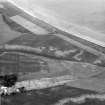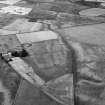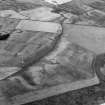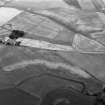Pricing Change
New pricing for orders of material from this site will come into place shortly. Charges for supply of digital images, digitisation on demand, prints and licensing will be altered.
Newbarns
Linear Feature(S) (Period Unknown), Pit(S) (Period Unknown), Souterrain (Iron Age)(Possible), Square Barrow (Iron Age)
Site Name Newbarns
Classification Linear Feature(S) (Period Unknown), Pit(S) (Period Unknown), Souterrain (Iron Age)(Possible), Square Barrow (Iron Age)
Canmore ID 35429
Site Number NO64NE 49
NGR NO 68256 49110
Datum OSGB36 - NGR
Permalink http://canmore.org.uk/site/35429
- Council Angus
- Parish Inverkeilor
- Former Region Tayside
- Former District Angus
- Former County Angus
NO64NE 49 68256 49110
NO 683 492 The second season of a programme of trial trenching was carried out to the W of Newbarns Farm (McGill 1998). The field is rich in cropmarks of varying forms, some of which are Scheduled.
Eleven trenches were excavated: three within the Scheduled area and eight outside it. Of this total, only two trenches were devoid of archaeological features.
The excavated features comprised pits, linear ditches, natural ice wedges, a truncated ring-ditch house, a sub-rectangular enclosure (possibly a Dark Age timber hall), and a possible square barrow. No features produced any artefactual dating evidence, and provisional dates can only be applied to three feature groups (the ring-ditch house, timber hall and square barrow-type feature) on the basis of their morphology. The results supported the conclusions from the previous year's work at Newbarns that the clarity of cropmarks is the result of a combination of topography, ploughsoil depth, subsoil, feature depth, size and nature of fill, with the principal deciding factor being geomorphological considerations. There was considerable evidence across the site for plough-scoring of subsoil and features, suggesting that active truncation is occurring.
A detailed report will be lodged with NMRS.
Sponsors: Historic Scotland, University of Edinburgh.
C McGill 1999
Aerial Photographic Transcription (24 February 1994 - 21 April 1994)
An aerial transcription was produced from oblique aerial photographs. Information from Historic Environment Scotland (BM) 31 March 2017.






























































